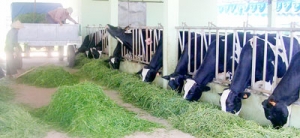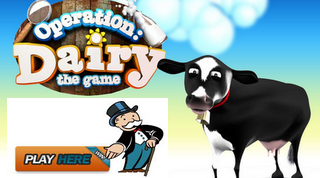World Markets

The hormone, which is produced naturally by cows, is also produced in synthetic form and can be used to improve milk production in cows. But it is not harmful to humans, according to LSU AgCenter dairy science professor Cathy Williams.
The hormone is talked about in numerous media ads for milk as if it were something totally foreign to the cows, Ms Williams said. “When in reality, the cows themselves produce it.”
The hormone is not widely used in the Louisiana dairy industry but is sometimes used in other areas of the country.
Ms Williams said the hormone is produced naturally by the pituitary gland in cows and other mammals and is responsible for producing muscle and making the animals grow.
“When a mature cow, which is finished growing, is given an injection of the hormone, it makes her more efficient in milk production,” Ms Williams said.
“So scientists have developed a way to genetically engineer bacteria that can make the growth hormone really fast,” she said. “This is the same way that insulin is produced for diabetics.”
The use of rBGH causes no harm to animals or humans, Gary Hay, director of the School of Animal Sciences said. There is little difference between rBGH in cattle and human growth hormone in people.
“When you see the ads saying the milk is from cows that have not been treated with the growth hormone, it could be a little misleading,” Mr Hay said. “This only means an affidavit has been signed by the producer stating this is true, but there is no test to really tell.”
Growth hormones in both plants and animals have no effect when transferred from one species to the other, Mr Hay said.
The hormone is injected into the cow because an oral dose would only be broken down into amino acids and excreted as any other protein, Mr Hay said.
It makes good business sense to treat dairy cows with this hormone, which increases milk production, he said.
“The cow can produce 15 per cent more milk if you give her this growth hormone,” Ms Williams said. “But, you also have to manage the cow differently.” You have to increase the feed for the cows in order to see the increases in milk production.
Ms Williams said she recently conducted a test with organic milk to see if the hormone was present. Her study found the hormone was present in every brand.
Some consumers have become concerned that this growth hormone is causing little girls to come into puberty earlier, but Williams says it’s not the milk.
“Part of what’s causing this early development is just better nutrition in general,” Ms Williams said. “Some of the hormones humans produce are a function of body fat, which is a result of nutrition.”
The level of the hormone in milk is so low that you would have to drink 25 gallons of milk per day to be affected, Ms Williams said. “That shouldn’t be a problem, since most of us have to push our kids to drink even three glasses a day.”























